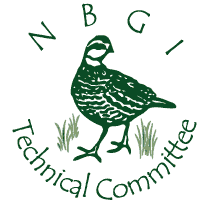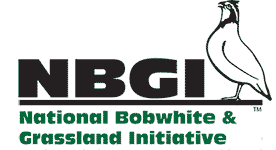… New NBCI Coordinated Implementation Program Taking Center Stage
Bobwhite experts from around the country will converge in West Des Moines, IA July 29-August 1 for the 2014 meeting of the National Bobwhite Technical Committee (NBTC).
Theme of the meeting is “Living on the Edge,” a reference to where the northern edge of the quail range meets the transitional edge between grasslands, forests and agriculture, according to Todd Bogenschutz, who is coordinating the event on behalf of the Iowa Department of Natural Resources. Iowa is one of 25 member states of the NBTC, the technical group guiding the National Bobwhite Conservation Initiative (NBCI), and West Des Moines will be the farthest north the bobwhite group has convened for its annual meeting.
Expected to be a central topic is the new NBCI Coordinated Implementation Program (http://goo.gl/wcQJBh). It was adopted by the NBCI Management Board – representing state wildlife agency directors — in March. The voluntary program lays out a specific, step-by-step roadmap for identifying and developing NBCI Bobwhite Focal Areas, along with measures of success, for impact on a landscape scale. And although the primary target is the bobwhite, the program’s impacts extend far beyond bobwhites to include a suite of declining songbirds, pollinators and other species. Six states, including Georgia, Iowa, Kentucky, Missouri, Texas and Virginia, beta tested the approach in 2013 and are moving forward with implementation. Oklahoma and Nebraska are expected to join in, and other states are primed to make announcements as well.
“I think some people will perhaps be surprised at some of the states that step up to the plate on this new program, developed by the states themselves, to make restoration attempts at a landscape scale more clear cut, definable and measurable,” said NBCI Director Don McKenzie. “The NBCI states run the gamut from the second largest state in the U.S. to the second smallest, and they cover a landscape that varies from the cornfields of the Midwest to the rangelands of Texas and the longleaf pine of the South. The variety is incredible.”
A wide range of additional issues will also be discussed in the context of bobwhite conservation and habitat management, including forest management, agriculture policy, grassland and grazing lands issues.
NBCI will also debut its National Fire Bird Conservation Awards program in Iowa. The program gives state quail coordinators the opportunity to recognize an individual, group or entity that has made “significant contributions” to the advancement of “the habitat-based, landscape-scale restoration of wild bobwhites.” (The term “fire bird” was first coined by biologist Herbert Stoddard, who published the first comprehensive study of bobwhites in 1931 and made the connection between the bobwhite’s dependency on fire on the landscape in much of its range.)
“Landscape-scale habitat restoration is exactly what we are all about,” said McKenzie. “And if there are individuals, groups or entities that are assisting the effort at that level then we want to recognize and thank them, and we want the world to know their contributions. We can’t restore wild bobwhite populations alone. It’s going to take the cooperation of many others.”
NBTC membership consists of dues-paying students or professionals (minimum bachelors degree, or currently enrolled as a student in wildlife or related science or art) employed by a state, provincial or federal agency, conservation group, or private company that has an interest in the conservation of wild bobwhites, or is self-employed with a professional interest in the conservation of wild bobwhites.
The Wildlife Society (TWS) is also offering up to 30 hours of continuing education units (CEUs) for maintenance of the “certified professional wildlife biologist” title for those certified wildlife biologists participating.
Cost of registration, including membership dues, is $250. Eligible participants can register at http://meetings.iowatws.org.
Meeting sponsors currently include Iowa State Pheasants Forever/Quail Forever, the National Wild Turkey Federation, Iowa Department of Natural Resources, the National Shooting Sports Foundation, the Quail Coalition and King Communications.

